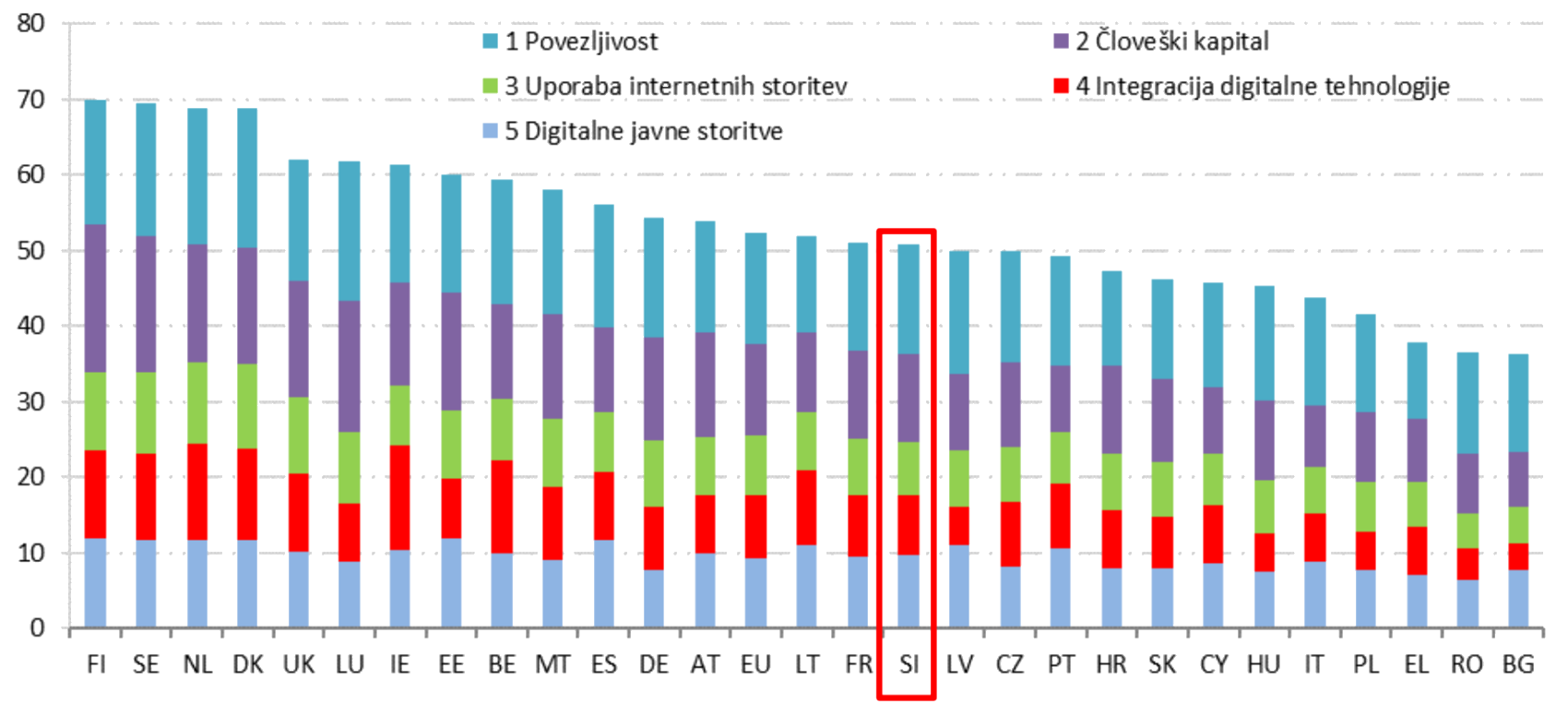How are we doing in digital economy?
According to the European Commission's Digital Economy and Society Index (DESI), Slovenia ranked 16th among 28 EU Member States, slipping down one place since 2018.
Although Slovenia's total score rose on account of better performance in certain criteria measured by DESI, the widening gap to the EU benchmark is worrying as it indicates that the pace of progress in other Member States is faster than in Slovenia.
What are our strengths and what can we do better?
Slovenia is doing very well in the connectivity and digital public services dimensions, but has not managed to increase its score in the use of internet services and digital technology. The human capital score is at the EU level but no progress has been made. The result for integration of digital technologies has improved but continues to lag behind the EU average.
In order to speed up the development of digital economy, Slovenia should strengthen:
- the use of digital tools and services in the public and private sectors,
- the development of digital and soft skills across the education system, as well as in life-long learning and employee retraining,
- innovation, entrepreneurship, further incentives for digital economy.
Ranking according to the Digital Economy and Society Index (DESI) for 2019

Source: Indeks digitalnega gospodarstva in družbe (DESI) – Poročilo o državi za leto 2019 – Slovenija
Digital maturity as a business aspect of digital transformation
McKinsey Digital report ‘The Rise of Digital Challengers: How digitization can become the next growth engine for Central and Eastern Europe’, which was presented by the Slovenian Chamber of Commerce and Trade, places Slovenia among the challengers that do not sufficiently exploit their digitization potential.
It seems we still have to do a lot of work before we can measure up against digital frontrunners from the USA and Asia, which are well ahead of us in many aspects.
- By the year 2025, Slovenia can generate an additional EUR 2.1 bn in GDP as a result of digitalization.
Source: McKinsey, 2019
This prediction was first included in the study of large and medium-sized companies, that was carried out by the Faculty of Economics. The study explored various business aspects of digital transformation, such as its strategic role, digital culture, digital maturity and organization. The results show that Slovenian organizations are at a lower level of digital maturity than their peers worldwide.
Digital maturity is higher in organizations where digital transformation is driven by a business initiative and is actually a business transformation. Compared to the rest of the world, however, Slovenian organizations lag behind their European counterparts in terms of customer experience (except in the trade industry).
How can we harness the potential of the digital transformation?
Our experience also shows that Slovenian companies have considerable reserves in the field of digitization of their operations, and there is plenty of room for improvement. If we want to digitize our business environment effectively, we will need suitable IT solutions, expertise and focus on the redesign of business processes and models with a strong commitment needed to implement change in companies.

Changes in the corporate culture often prove to be the hardest of all challenges. In order for Slovenian companies to be able to raise the bar of digital maturity, the following primary factors need to be observed in daily operations with customers:
#1 The digitalization process must be business-driven
We notice that digital transformation initiatives and initiators come mostly from the business part of the organization, i.e. from management teams who are aware that this is the only way to stay competitive, while the IT staff seems to be content with its more modest and highly technical role.
Management normally states the following as their digitalization goals:
- improved competitiveness,
- higher employee performance,
- improved responsiveness to new market demands and expectations,
- cost optimization,
- higher profitability.
#2 Raising awareness of digital transformation
In order to fully grasp the benefits, added value and the urgency of digitalization, we need to build the awareness and understanding of digitalization in a wider context. Therefore we devoutly support all initiatives such as the Digital Innovation Hub Slovenia, which promote the growth of digital competencies and exchange of digital experience and good practice cases at the local, regional and international levels. It also offers companies financial incentives to grow digital competencies.
#3 Improved knowledge and digital competencies
Simply understanding the complex mix of activities that make up digitalization requires appropriate expertise which many companies lack. Therefore, one of the key tasks for Slovenia is to strengthen the digital competencies, knowledge and invest in employee development and growth. More emphasis should be placed on implementing the principles of agile work, cross-departmental collaboration, promotion of innovation, and openness to learning and change.
#4 Changing the corporate culture
We see that digitalization is heavily dependent on support activities that assist in changing the organizational culture. It is a great challenge for companies to change the established habits of employees, motivate them to use new IT solutions and show them the added value that digitalization will bring to the company and all individuals involved in the company's day to day processes.
#5 Focus on the business model
Although companies hope digitization will bring higher efficiency and savings, the project itself often does not generate savings equal to the investment, at least not in its early stages. The long-term benefits that outweigh the quick immediate effects will be seen when the system is completed and the flow of information smoother. That is why it is crucial to focus on redesigning business processes and implementing new business models that enable companies to boost their digital transformation and unlock their digital business potential.
Want to know more? Contact us!




